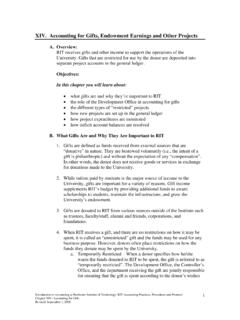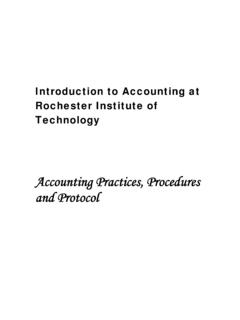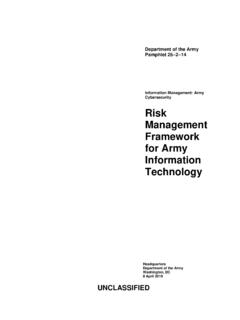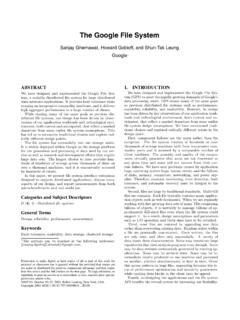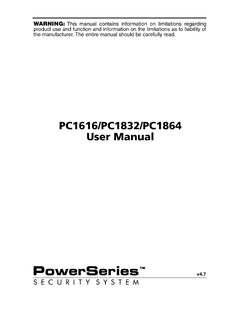Transcription of Russia’s Reflexive Control Theory and the Military
1 Journal of Slavic Military Studies 17: 237 256, 2004 Copyright 2004 Taylor & FrancisISSN:1351-8046 s Reflexive Control Theory and the Military TIMOTHY L. THOMAS Reflexive Control is a subject that has been studied in the Soviet Union and Russiafor nearly 40 years. The Theory has both Military and civilian uses. This articledescribes both the Theory and practice of Reflexive Control , focusing on recentdevelopments. The concept is close in meaning to the US concept of One of the prime goals for a commander in warfare is to inter-fere with the decision-making process of an enemy goal is often accomplished by the use of disinformation,camouflage, or some other stratagem.
2 For Russia, one of the primarymethods is through the use of the Theory of Reflexive Control (RC).This principle can be used against either human-mental or com-puter-based decision-making processors. The Theory is similar to theidea of perception management, except that it attempts to controlmore than manage a subject. Reflexive Control is defined as a means of conveying to a partneror an opponent specially prepared information to incline him to volun-tarily make the predetermined decision desired by the initiator of theaction. Even though the Theory was developed long ago in Russia, it isstill undergoing further refinement. Recent proof of this is the develop-ment in February 2001, of a new Russian journal known as ReflexiveProcesses and Control .
3 The journal is not simply the product of agroup of scientists but, as the editorial council suggests, the product ofsome of Russia s leading national security institutes, and boasts a fewforeign members as well. The editorial council (which is different thanthe editorial board) includes a member of the Federal Agency forGovernment Communications and Information (FAPSI), a diplomat, a238 THE JOURNAL OF SLAVIC Military STUDIESC anadian, and two Americans, and the deputy head of the InformationSecurity Committee of the Russian Security Council, among are many examples, from a Russian perspective, of the useof Reflexive Control Theory during conflicts.
4 One of the most recent andmemorable was the bombing of the market square in Sarejevo in minutes of the bombing, CNN and other news outlets werereporting that a Serbian mortar attack had killed many innocent peoplein the square. Later, crater analysis of the shells that impacted in thesquare, along with other supporting evidence, indicated that the inci-dent did not happen as originally reported. This evidence also threwinto doubt the identities of the perpetrators of the attack. One indivi-dual close to the investigation, Russian Colonel Andrei Demurenko,Chief of Staff of Sector Sarejevo at the time, stated, I am not sayingthe Serbs didn t commit this atrocity.
5 I am saying that it didn t happenthe way it was originally reported. A US and Canadian officer soonbacked this position. Demurenko believed that the incident was anexcellent example of Reflexive Control , in that the incident was made tolook like it had happened in a certain way to confuse article will discuss the Military aspect of Russia s conceptof Reflexive Control in some detail, and its role as an informationwarfare weapon. It will also briefly examine how US writers inter-pret RC Theory . NATURE OF Reflexive Control The concept of Reflexive Control (RC) has existed much longerthan the concepts of information warfare and information opera -tions; in fact, it appeared in Soviet Military literature 30 years that time, V.
6 A. Lefebvre, who was working within the contextand logic of a Reflexive game, defined Reflexive Control as a processby which one enemy transmits the reasons or bases for making deci-sions to another. 1 The development of Reflexive Control theoryencompasses four distinct periods: research (from the early 1960s to the late 1970s); practical-orientation (from the late 1970s to the early 1990s); psychological-pedagogical (from the early to the mid 1990s); and psycho-social (from the late 1990s). The concept of Reflexive Control is still somewhat alien to USaudiences. However, the Russians employ it not only on the strategicRUSSIA S Reflexive Control THEORY239and tactical levels in war but also on the strategic level in associationwith internal and external politics.
7 Equally significant, the concept hasnot always benefited the Soviet Union and Russia. For example, someRussians consider that the Strategic Defense Initiative (SDI) is a clas-sic example of US use of Reflexive Control . In this case, the US com-pelled the enemy to act according to a plan favorable to the US. Bydoing so, it forced the Soviet Union to try to keep pace with America sachievements in the SDI arena (or at least what we said were ourachievements) and ultimately exhausted the Soviet Union economic-ally as it spent money to develop corresponding equipment. As aresult, some Russians are now asking themselves whether the conceptof information warfare is yet another US attempt to Control them reflexively and to force them to invest vast sums of money in a realmthat is simply beyond their technological reach in the near Soviet and Russian Armed Forces have long studied the useof Reflexive Control Theory , particularly at the tactical and opera -tional levels, both for maskirovka (deception) and disinformationpurposes and, potentially, to Control the enemy s For example, the Russian Army had a Military maskirovkaschool as early as 1904 that was later disbanded in 1929.
8 Thisschool, the Higher School of Maskirovka, provided the bases formaskirovka concepts and created manuals for future the early 1960s, there have been many Russian intellectual giants who have emerged in the field of Reflexive Theory . In thecivilian sector, these include G. P. Schedrovitsky, V. E. Lepsky,V. A. Lefebvre (who now lives in the West), D. A. Pospelov,V. N. Burkov, and many others. The foremost theorists in the mili-tary sector include V. V. Druzhinin, M. D. Ionov, D. S. Kontorov,S. Leonenko, and several others. One of the civilian theorists, Lepsky,who also is the editor of the new RC journal, hopes that the currentUS-Russian cooperation in the realm of Reflexive Control will moveRusso-American relations from the paradigm of IW/IO (confrontation,struggle) to a paradigm of partnership (the Control of confrontation).
9 His is a noble cause and one that must be taken seriously. There is a growing realization on both sides that Lepsky s twoparadigms will evolve in parallel. US and Russian theorists areengaged in joint work regarding conflict prevention Theory and areworking together in Bosnia and Kosovo. At the same time, bothcountries are carrying out Reflexive Control work independently inthe Military JOURNAL OF SLAVIC Military STUDIESRC is also considered as an information warfare means. Forexample, Major General N. I. Turko, an instructor at the RussianFederation s General Staff Academy, has established a direct con-nection between IW/IO and Reflexive Control .
10 He noted: The most dangerous manifestation in the tendency to rely on Military power relatesmore to the possible impact of the use of Reflexive Control by the opposing sidethrough developments in the Theory and practice of information war rather than tothe direct use of the means of armed In Turko s judgment, RC is an information weapon that is moreimportant in achieving Military objectives than traditional this regard, Turko s understanding is most likely influenced by hisbelief that American use of information weapons during the Cold Wardid more to defeat the Soviet Union and cause its demise than anyother weapon. An excellent example was the Strategic Defense Initia-tive.



